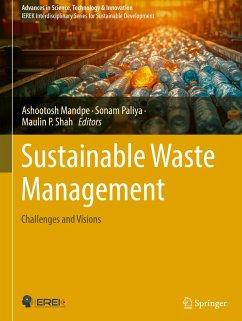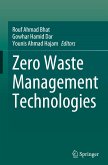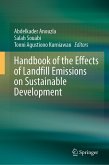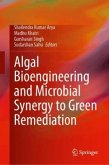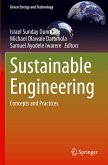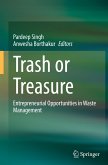Sustainable Waste Management
Challenges and Visions
Herausgegeben:Mandpe, Ashootosh; Paliya, Sonam; Shah, Maulin P.
Sustainable Waste Management
Challenges and Visions
Herausgegeben:Mandpe, Ashootosh; Paliya, Sonam; Shah, Maulin P.
- Gebundenes Buch
- Merkliste
- Auf die Merkliste
- Bewerten Bewerten
- Teilen
- Produkt teilen
- Produkterinnerung
- Produkterinnerung
This book explores different aspects associated with the genesis of solid waste management problems and brings forward the challenges posed by the solid waste management sector and its impact on the environment. Additionally, the book discusses various effects of improper waste management practices considering the environmental, social, governance, engineering, and management aspects emphasizing on waste minimization strategies and circular economy approaches.This book encapsulates numerous ideas for developing novel strategies towards sustainable waste management, incorporating technology…mehr
Andere Kunden interessierten sich auch für
![A Vision for Environmental Sustainability: Overcoming Waste Management Challenges in Developing Countries A Vision for Environmental Sustainability: Overcoming Waste Management Challenges in Developing Countries]() A Vision for Environmental Sustainability: Overcoming Waste Management Challenges in Developing Countries166,99 €
A Vision for Environmental Sustainability: Overcoming Waste Management Challenges in Developing Countries166,99 €![Zero Waste Management Technologies Zero Waste Management Technologies]() Zero Waste Management Technologies113,99 €
Zero Waste Management Technologies113,99 €![Handbook of the Effects of Landfill Emissions on Sustainable Development Handbook of the Effects of Landfill Emissions on Sustainable Development]() Handbook of the Effects of Landfill Emissions on Sustainable Development119,99 €
Handbook of the Effects of Landfill Emissions on Sustainable Development119,99 €![Algal Bioengineering and Microbial Synergy to Green Remediation Algal Bioengineering and Microbial Synergy to Green Remediation]() Algal Bioengineering and Microbial Synergy to Green Remediation121,99 €
Algal Bioengineering and Microbial Synergy to Green Remediation121,99 €![Sustainable Engineering Sustainable Engineering]() Sustainable Engineering117,99 €
Sustainable Engineering117,99 €![Trash or Treasure Trash or Treasure]() Trash or Treasure106,99 €
Trash or Treasure106,99 €![Trash or Treasure Trash or Treasure]() Trash or Treasure106,99 €
Trash or Treasure106,99 €-
-
-
This book explores different aspects associated with the genesis of solid waste management problems and brings forward the challenges posed by the solid waste management sector and its impact on the environment. Additionally, the book discusses various effects of improper waste management practices considering the environmental, social, governance, engineering, and management aspects emphasizing on waste minimization strategies and circular economy approaches.This book encapsulates numerous ideas for developing novel strategies towards sustainable waste management, incorporating technology transfer and capacity building for sustainable waste management, and enforcing the stringent policy framework for environmental protection from improper waste management practices. This book is an essential resource for researchers and students studying solid waste management, waste valorization, biorefineries, biofuels/products/processes, as well as for geo-environmental engineers, biochemical/chemical engineers, and biotechnologists working in industries and government agencies, policy makers, conservationists, NGOs working for environment protection, etc.
Produktdetails
- Produktdetails
- Advances in Science, Technology & Innovation
- Verlag: Springer / Springer Nature Switzerland / Springer, Berlin
- Artikelnr. des Verlages: 978-3-031-85684-6
- Seitenzahl: 308
- Erscheinungstermin: 29. Juli 2025
- Englisch
- Abmessung: 285mm x 215mm x 23mm
- Gewicht: 916g
- ISBN-13: 9783031856846
- ISBN-10: 3031856848
- Artikelnr.: 72917311
- Herstellerkennzeichnung
- Springer-Verlag KG
- Sachsenplatz 4-6
- 1201 Wien, AT
- ProductSafety@springernature.com
- Advances in Science, Technology & Innovation
- Verlag: Springer / Springer Nature Switzerland / Springer, Berlin
- Artikelnr. des Verlages: 978-3-031-85684-6
- Seitenzahl: 308
- Erscheinungstermin: 29. Juli 2025
- Englisch
- Abmessung: 285mm x 215mm x 23mm
- Gewicht: 916g
- ISBN-13: 9783031856846
- ISBN-10: 3031856848
- Artikelnr.: 72917311
- Herstellerkennzeichnung
- Springer-Verlag KG
- Sachsenplatz 4-6
- 1201 Wien, AT
- ProductSafety@springernature.com
Dr. Ashootosh Mandpe Dr. Ashootosh Mandpe works as an Assistant Professor at the Indian Institute of Technology Indore, where he has been inspiring students and advancing the field of environmental engineering since October 2021. With over eight years of experience in Environmental Engineering and Science, Dr. Mandpe’s academic journey began with a degree in Civil Engineering from the University of Pune, followed by an M.Tech in Environmental and Water Resources Engineering from the College of Engineering Pune (COEP). He earned his Ph.D. from the Academy of Scientific & Innovative Research (AcSIR) while working at CSIR-National Environmental Engineering Research Institute (CSIR-NEERI), Nagpur, a leading research institution in India. Dr. Mandpe has an impressive academic and research portfolio, having published several peer-reviewed articles in high-impact SCI-indexed journals, including the Journal of Cleaner Production, Bioresource Technology, and Chemosphere. His research contributions have been recognized with over 720+ Google Scholar citations, an h-index of 14, and an i10-index of 16. He is also an accomplished author and editor, contributing significantly to the academic community through multiple books and chapters. His works include the Taylor & Francis series Environmental Resilience and Solid Waste Management and titles approved by prestigious publishers such as Springer Nature and Bentham Science. Additionally, he serves as a Guest Editor for special issues in leading journals like Environmental Chemistry and Ecotoxicology and the Journal of Basic Microbiology. As a Principal Investigator, Dr. Mandpe has led numerous consultancy and research projects, particularly in effluent treatment, waste management, and renewable energy. His innovative approach and leadership have advanced sustainable practices in environmental engineering. He has also shared his expertise widely, participating in national and international conferences and delivering invited talks on sustainable waste management. Dr. Mandpe’s contributions extend beyond academia into practical applications and policy-level impact, reflecting his dedication to addressing global environmental challenges. His efforts are instrumental in promoting awareness and advancing research in sustainable waste management, environmental resilience, and renewable energy solutions. Dr. Sonam Paliya Dr. Sonam Paliya, a Humboldt Fellow, is currently advancing her research at RWTH Aachen University, Germany. Her expertise spans over eight years in Biological and Environmental Sciences, focusing on innovative approaches to sustainability and waste management. Dr. Paliya completed her Ph.D. at the Academy of Scientific & Innovative Research (AcSIR) under the mentorship of eminent scientists at CSIR-National Environmental Engineering Research Institute (CSIR-NEERI), Nagpur. Her academic journey is marked by prestigious accolades, including the Alexander von Humboldt Foundation Fellowship, UGC-NET JRF, ICAR-NET, and RGNF (Govt. of India). She has received several awards, such as the Best Young Researcher Award 2020 (Late Shri. P.S. Dutt Memorial Award) and the Madhya Pradesh Young Scientist Training Fellowship (2017, 2023). Her work has been widely recognized in international forums, with numerous presentations and awards at reputed conferences. Dr. Paliya’s research contributions focus on leveraging microbial and biotechnological advancements to address environmental challenges. Her research on waste valorization, bioremediation, and sustainability solutions has resulted in impactful publications and collaborative projects globally. As an accomplished academic and researcher, Dr. Paliya’s commitment to fostering sustainable practices and innovative research continues to inspire and influence the scientific community. Dr. Maulin Shah Maulin P. Shah is currently working as Deputy General Manager—Industrial Wastewater Research Lab, Division of Applied and Environmental Microbiology Lab at Enviro Technology Ltd., Ankleshwar, Gujarat, India, received his Ph.D. (2002-2005) in Environmental Microbiology from Sardar Patel University, Vallabh Vidyanagar, Gujarat. He has served as Assistant Professor at Godhra, Gujarat University in 2001. He is Microbial Biotechnologist with diverse research interest. A group of research scholars is working under his guidance on the areas ranging from Applied Microbiology, Environmental Biotechnology, Bioremediation, and Industrial Liquid Waste Management to solid state fermentation.
Chapter 1: Optimizing Sanitation Sustainability: Harnessing Biochar Co-digestion of Faecal Sludge for Resource Reclamation and Energy generation.- Chapter 2: Analysis of e waste management on environmental hazards and population health impact.- Chapter 3: Streamlining E-waste Management for a Greener Tomorrow.- Chapter 4: Utility of Plastic Waste in the construction industry as carbon neutral initiatives.- Chapter 5: Navigating the Microplastic Challenge: Unravelling the Dynamics in Anaerobic Digestion and Treatment Processes of Sewage Sludge.- Chapter 6: Preserving Health and Environment :Mastering Biomedical Waste Management.- Chapter 7: Environmental sustainability through phytoremediation of biomedical wastes.- Chapter 8: Emphasising the importance of managing biomedical waste for the well-being of both health and the environments.- Chapter 9: Redefining Hazardous Waste Management: Risks, Regulations, and Resilient Solutions.- Chapter 10: Antibiotic residues in hospital effluents: Impacts and Mitigation.- Chapter 11: Building a Strong Foundation: Study on Use of Construction and Demolition Waste in Stone Columns.- Chapter 12: Efficient Construction & Demolition Waste Management Practices.- Chapter 13: Towards a circular economy: Achieving zero waste through Integrated Farming System (IFS).- Chapter 14: The potential utility of terrestrial weed biomass in bioenergy production.- Chapter 15: Industrial Waste Management: Construction Industry-Driven Solution.- Chapter 16: WINNING SUSTAINABILITY THROUGH WASTE MANAGEMENT: POTENTIAL WASTE-TO-ENERGY (WtE) TECHNIQUES AND SUSTAINABLE STRATEGIES ANALYSIS.- Chapter 17: Unleashing Waste to Energy Technologies.- Chapter 18: Socio-Environmental Impacts of Sustainable Waste Management.
Chapter 1: Optimizing Sanitation Sustainability: Harnessing Biochar Co-digestion of Faecal Sludge for Resource Reclamation and Energy generation.- Chapter 2: Analysis of e waste management on environmental hazards and population health impact.- Chapter 3: Streamlining E-waste Management for a Greener Tomorrow.- Chapter 4: Utility of Plastic Waste in the construction industry as carbon neutral initiatives.- Chapter 5: Navigating the Microplastic Challenge: Unravelling the Dynamics in Anaerobic Digestion and Treatment Processes of Sewage Sludge.- Chapter 6: Preserving Health and Environment :Mastering Biomedical Waste Management.- Chapter 7: Environmental sustainability through phytoremediation of biomedical wastes.- Chapter 8: Emphasising the importance of managing biomedical waste for the well-being of both health and the environments.- Chapter 9: Redefining Hazardous Waste Management: Risks, Regulations, and Resilient Solutions.- Chapter 10: Antibiotic residues in hospital effluents: Impacts and Mitigation.- Chapter 11: Building a Strong Foundation: Study on Use of Construction and Demolition Waste in Stone Columns.- Chapter 12: Efficient Construction & Demolition Waste Management Practices.- Chapter 13: Towards a circular economy: Achieving zero waste through Integrated Farming System (IFS).- Chapter 14: The potential utility of terrestrial weed biomass in bioenergy production.- Chapter 15: Industrial Waste Management: Construction Industry-Driven Solution.- Chapter 16: WINNING SUSTAINABILITY THROUGH WASTE MANAGEMENT: POTENTIAL WASTE-TO-ENERGY (WtE) TECHNIQUES AND SUSTAINABLE STRATEGIES ANALYSIS.- Chapter 17: Unleashing Waste to Energy Technologies.- Chapter 18: Socio-Environmental Impacts of Sustainable Waste Management.

